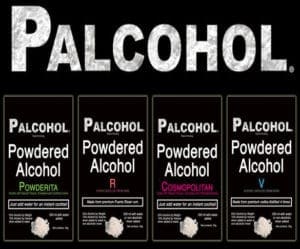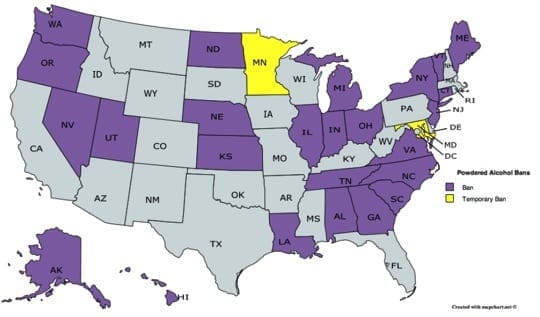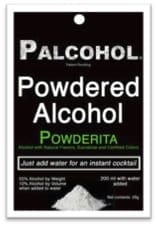Powdered Alcohol Ban
During the 2016 legislative session, the Maryland General Assembly passed a two-year moratorium on the sale of powdered alcohol. That ban was made permanent in 2018.

- In general, “powdered alcohol” is alcohol that has been absorbed by a sugar derivative. Powdered alcohol products first began appearing in the 19th century, with many companies seeking patents for similar types of products since then. Although powdered alcohol has been sold internationally, no company has succeeded in successfully selling it in the U.S.1
- On April 8, 2014, the Alcohol Tobacco Tax and Trade Bureau (“TTB”) approved labels for a powdered alcohol product called “Palcohol” 2 Developed by a private company in Arizona, Lipsmark, LLC, Palcohol was to be sold in one-‐ounce packages and was designed to be added to water to create a standard mixed drink.3
- When first approved, the Palcohol website stated alternative uses for the product. For example, “Yes, you can snort it. And you’ll get drunk almost instantly because the alcohol will be absorbed so quickly in your nose. Good idea? No. It will mess you up. Use Palcohol responsibly.” Or, “We found adding Palcohol to food is so much fun… Remember, you have to add Palcohol AFTER a dish is cooked as the alcohol will burn off if you cook with it… and that defeats the whole purpose.” And finally, “What’s worse than going to a concert, sporting event, etc. and having to pay $10, $15, $20 for a mixed drink with tax and tip… Take Palcohol into the venue and enjoy a mixed drink for a fraction of the cost.” 4
 On April 21, 2014, the TTB stated that it had issued the label approvals in error. 5
On April 21, 2014, the TTB stated that it had issued the label approvals in error. 5
- On March 10, 2015, the TTB re‐issued approval for the labels of four types of Palcohol: Rum-flavored, Vodka-‐flavored, Cosmopolitan and Powderita.6 The label states that the powder is 50 percent alcohol by weight and 10 percent alcohol by volume. The Palcohol website currently states that the company hopes to have the product available for sale soon.7
- Public health professionals and state government officials have raised concerns about powdered alcohol, stating that the convenience of the packets could intentionally or unintentionally result in stronger than standard drinks and harmful over-consumption. Moreover, the different flavors and the ease with which the powdered alcohol can be concealed and transported would have particular appeal to underage drinkers.8
- States first began enacting laws to regulate powdered alcohol in the late 1970s.9 After the initial TTB approval of Palcohol in 2014, a wave of states began introducing and enacting legislation to regulate or ban the sale of powdered alcohol in their states.10

As of November, 2015:
- Twenty-five states had enacted a permanent ban on the sale of powdered alcohol: Alabama,11 Alaska,12 Connecticut,13 Georgia,14 Hawaii15, Illinois,16 Indiana, 17 Kansas,18 Louisiana,19 Maine,20 Michigan,21 Nebraska,22 Nevada,23 New Jersey,24 New York,25 North Carolina,26 North Dakota,27 Ohio,28 Oregon,29 South Carolina,30 Tennessee,31 Utah,32 Vermont,33 Virginia,34 and Washington35 statutorily prohibited the sale of powdered alcohol. In addition, Maryland36 and Minnesota37 had enacted temporary 13-month statutory bans.
- Four states38 — Colorado, Delaware, New Hampshire and New Mexico—had expanded the statutory definition of alcohol so that powdered alcohol can be regulated under their existing alcohol statutes.
- Twelve states39 and the District of Columbia40 had introduced bans on the sale of powdered alcohol in their states’ legislatures: Arizona, Florida, Iowa, New Mexico, Massachusetts, Missouri, Oklahoma, Pennsylvania, Rhode Island, Wisconsin and Wyoming. Kentucky41 had introduced legislation to regulate powdered alcohol in the same manner as other alcoholic products
- The Massachusetts Alcoholic Beverage Control Commission issued an advisory stating that powdered alcohol is not considered an “alcoholic beverage” in Massachusetts, and thus it remains illegal there.42
- The Pennsylvania Liquor Control Board has stated that the state store system will not list powdered alcohol products in its stores.43
- Prior to a statute being enacted in Maryland, the Maryland State Licensed Beverage Association, Maryland Beer Wholesalers Association and the Licensed Beverage Distributors of Maryland had voluntarily agreed to ban the distribution and sale of powdered alcohol.44
References
Updated February 2016
1 National Alcohol Beverage Control Association (NABCA). “Powdered Alcohol: An Encapsulation.” (2014, December). p.1-2. Available at: http://www.nabca.org/assets/Docs/Research/PowderedAlcoholPaper.pdf
2 National Alcohol Beverage Control Association (NABCA). “Powdered Alcohol: An Encapsulation.” (2014, December). p. 1. Available at: http://www.nabca.org/assets/Docs/Research/PowderedAlcoholPaper.pdf
3 Palcohol Website: www.palcohol.com
4 Mick, J. (April 22, 2014). “Controversy Erupts Over Rejection of Powdered Alcohol in U.S.” Daily Tech. Available at:http://www.dailytech.com/Controversy+Erupts+Over+Rejection+of+Powdered+Alcohol+in+US/article34768.htm
5 Choi, C. (April 21, 2014). Powdered alcohols no longer have label approvals. Available at:http://bigstory.ap.org/article/powdered-alcohols-dont-have-approvals
6 “Palcohol” Powdered Alcohol Wins Federal Approval (March 11, 2015). CBS News. Retrieved from:http://www.cbsnews.com/ news/palcohol-powdered-alcohol-wins-federal-approval/
7 Palcohol Website: www.palcohol.com
8 Firger, J. (2014, April 23). Palcohol powdered alcohol may present serious health risks, experts say. CBS News. Retrieved from http://cbsnews.com; Naimi, T.S. & Mosher, J.F. (2015). Powdered alcohol products: New challenge in an era of needed regulation. JAMA 314(2): 119-120; Wilson, R. (2014, April 30). Lawmakers begin moves to ban powdered alcohol. The Washington Post. Retrieved from http://www.washingtonpost.com
9 National Alcohol Beverage Control Association (NABCA). “Powdered Alcohol: An Encapsulation.” (2014, December). p.1-2. Available at: http://www.nabca.org/assets/Docs/Research/PowderedAlcoholPaper.pdf
10 National Conference of State Legislatures. “Powdered Alcohol 2014 Legislation.” (December 4, 2014). Available at:http://www.ncsl.org/research/financial-services-and-commerce/powdered-alcohol-2014-legislation.aspx; National Conference of State Legislatures; “Powdered Alcohol 2015 Legislation.” (March 11, 2015). Available at: http://www.ncsl.org/research/financial-services-and-commerce/powdered-alcohol-2015-legislation.aspx
11 Ala.Code 1975 § 28-1-8.
12 AS § 04.16.110.
13 2015 CT S.B. 386.
14 Ga. Code Ann., § 3-3-34.
15 HRS §281-5
16 235 ILCS 5/6-34.5
17 IC 7.1-5-8-11.
18 2015 KS H.B. 2208.
19 LSA-R.S. 2014 §26:351
20 28-A MRSA §2089.
21 M.C.L.A. 436.1914a
22 Neb.Rev.St. LB 330, § 8.
23 N.R.S. SB 464, § 1.
24 NJ LEGIS 137 (2015).
25 McKinney’s Alcoholic Beverage Control Law § 100.
26 N.C.G.S.A. § 18B-102.
272015 North Dakota Laws Ch. 76 (H.B. 1464).
28 R.C. § 4301.71.
29 2015 OR S.B. 937.
30 SC Code 1976 §61-6-4157
31 T. C. A. § 57-3-414.
32 U.C.A. 1953 § 32B-4-424.
33 7 V.S.A. §69.
34 2015 Virginia Laws No. 202 (S.B. 299).
35 West’s RCWA 66.44.0001.
36 MD Code, Art. 2B, § 16-505.3.
37 2013 MN H.F. 3364.
38 C.R.S.A. § 12-47-103; 4 Del.C. § 101; N.H. Rev. Stat. § 175:1 and N. M. S. A. 1978, § 60-3A-3.
39 Arizona House Bill No. 2057 (introduced 2/17/15); Florida House Bill No. 1247 (introduced 4/16/15); Iowa House Bill No. 494 (introduced 3/4/15); New Mexico House Bill 550 (introduced 2/3/15); Massachusetts House Bill No. 243 (introduced 1/16/15); Missouri House Bill No. 1325 (introduced 3/12/15); Oklahoma Senate Bill No. 720 (introduced 1/23/15); Pennsylvania Senate Bill No. 588 (introduced 3/19/15) and Pennsylvania House Bill No. 847 (introduced 3/25/15); Rhode Island House Bill No. 5189 (introduced 1/21/15 but only banning powdered alcohol for those under the age of 21) and Rhode Island Senate Bill No. 175 (introduced 2/5/15); Wisconsin Senate Bill No. 10 (introduced 1/23/15) and 2015 Wisconsin Assembly Bill No. 72 (introduced 1/23/15); and Wyoming Senate Bill No. 106 (introduced 1/21/15).
40 2015 Washington DC Legislative Bill No. 253 (introduced 6/12/15).
41 Kentucky House Bill 71 (3/24/15) and Kentucky Senate Bill 81 (1/9/15).
42 “Alcoholic Beverages Control Commission (ABCC) Advisory Regarding Powdered Alcohol.” (March 12, 2015). Retrieved from: http://www.mass.gov/abcc/pdf/ABCCAdvisoryPowderedAlcohol2015.pdf.
43 Pennsylvania Liquor Control Board. (Feb. 11, 2015). The Pennsylvania Liquor Control Board Will Not Sell Powdered Alcohol Products in Fine Wine & Good Spirits Stores. Retrieved from: http://www.prnewswire.com/news-releases/the-pennsylvania-liquor-control-board-will-not-sell-powdered-alcohol-products-in-fine-wine–good-spirits-stores-300034645.html
44 Peter Franchot, Comptroller of Maryland. (March 25, 2015). Peter Franchot Announces Alcohol Industry’s Voluntary Ban of Powdered Alcohol in Maryland. Available at: http://comptroller.marylandtaxes.com/Media_Services/2015/03/25/peter-franchot- announces-alcohol-industrys-voluntary-ban-of-powdered-alcohol-in-maryland/
Powdered Alcohol Ban
During the 2016 legislative session, the Maryland General Assembly passed a two-year moratorium on the sale of powdered alcohol. That ban was made permanent in 2018.

- In general, “powdered alcohol” is alcohol that has been absorbed by a sugar derivative. Powdered alcohol products first began appearing in the 19th century, with many companies seeking patents for similar types of products since then. Although powdered alcohol has been sold internationally, no company has succeeded in successfully selling it in the U.S.1
- On April 8, 2014, the Alcohol Tobacco Tax and Trade Bureau (“TTB”) approved labels for a powdered alcohol product called “Palcohol” 2 Developed by a private company in Arizona, Lipsmark, LLC, Palcohol was to be sold in one-‐ounce packages and was designed to be added to water to create a standard mixed drink.3
- When first approved, the Palcohol website stated alternative uses for the product. For example, “Yes, you can snort it. And you’ll get drunk almost instantly because the alcohol will be absorbed so quickly in your nose. Good idea? No. It will mess you up. Use Palcohol responsibly.” Or, “We found adding Palcohol to food is so much fun… Remember, you have to add Palcohol AFTER a dish is cooked as the alcohol will burn off if you cook with it… and that defeats the whole purpose.” And finally, “What’s worse than going to a concert, sporting event, etc. and having to pay $10, $15, $20 for a mixed drink with tax and tip… Take Palcohol into the venue and enjoy a mixed drink for a fraction of the cost.” 4
 On April 21, 2014, the TTB stated that it had issued the label approvals in error. 5
On April 21, 2014, the TTB stated that it had issued the label approvals in error. 5
- On March 10, 2015, the TTB re‐issued approval for the labels of four types of Palcohol: Rum-flavored, Vodka-‐flavored, Cosmopolitan and Powderita.6 The label states that the powder is 50 percent alcohol by weight and 10 percent alcohol by volume. The Palcohol website currently states that the company hopes to have the product available for sale soon.7
- Public health professionals and state government officials have raised concerns about powdered alcohol, stating that the convenience of the packets could intentionally or unintentionally result in stronger than standard drinks and harmful over-consumption. Moreover, the different flavors and the ease with which the powdered alcohol can be concealed and transported would have particular appeal to underage drinkers.8
- States first began enacting laws to regulate powdered alcohol in the late 1970s.9 After the initial TTB approval of Palcohol in 2014, a wave of states began introducing and enacting legislation to regulate or ban the sale of powdered alcohol in their states.10

As of November, 2015:
- Twenty-five states had enacted a permanent ban on the sale of powdered alcohol: Alabama,11 Alaska,12 Connecticut,13 Georgia,14 Hawaii15, Illinois,16 Indiana, 17 Kansas,18 Louisiana,19 Maine,20 Michigan,21 Nebraska,22 Nevada,23 New Jersey,24 New York,25 North Carolina,26 North Dakota,27 Ohio,28 Oregon,29 South Carolina,30 Tennessee,31 Utah,32 Vermont,33 Virginia,34 and Washington35 statutorily prohibited the sale of powdered alcohol. In addition, Maryland36 and Minnesota37 had enacted temporary 13-month statutory bans.
- Four states38 — Colorado, Delaware, New Hampshire and New Mexico—had expanded the statutory definition of alcohol so that powdered alcohol can be regulated under their existing alcohol statutes.
- Twelve states39 and the District of Columbia40 had introduced bans on the sale of powdered alcohol in their states’ legislatures: Arizona, Florida, Iowa, New Mexico, Massachusetts, Missouri, Oklahoma, Pennsylvania, Rhode Island, Wisconsin and Wyoming. Kentucky41 had introduced legislation to regulate powdered alcohol in the same manner as other alcoholic products
- The Massachusetts Alcoholic Beverage Control Commission issued an advisory stating that powdered alcohol is not considered an “alcoholic beverage” in Massachusetts, and thus it remains illegal there.42
- The Pennsylvania Liquor Control Board has stated that the state store system will not list powdered alcohol products in its stores.43
- Prior to a statute being enacted in Maryland, the Maryland State Licensed Beverage Association, Maryland Beer Wholesalers Association and the Licensed Beverage Distributors of Maryland had voluntarily agreed to ban the distribution and sale of powdered alcohol.44
References
Updated February 2016
1 National Alcohol Beverage Control Association (NABCA). “Powdered Alcohol: An Encapsulation.” (2014, December). p.1-2. Available at: http://www.nabca.org/assets/Docs/Research/PowderedAlcoholPaper.pdf
2 National Alcohol Beverage Control Association (NABCA). “Powdered Alcohol: An Encapsulation.” (2014, December). p. 1. Available at: http://www.nabca.org/assets/Docs/Research/PowderedAlcoholPaper.pdf
3 Palcohol Website: www.palcohol.com
4 Mick, J. (April 22, 2014). “Controversy Erupts Over Rejection of Powdered Alcohol in U.S.” Daily Tech. Available at:http://www.dailytech.com/Controversy+Erupts+Over+Rejection+of+Powdered+Alcohol+in+US/article34768.htm
5 Choi, C. (April 21, 2014). Powdered alcohols no longer have label approvals. Available at:http://bigstory.ap.org/article/powdered-alcohols-dont-have-approvals
6 “Palcohol” Powdered Alcohol Wins Federal Approval (March 11, 2015). CBS News. Retrieved from:http://www.cbsnews.com/ news/palcohol-powdered-alcohol-wins-federal-approval/
7 Palcohol Website: www.palcohol.com
8 Firger, J. (2014, April 23). Palcohol powdered alcohol may present serious health risks, experts say. CBS News. Retrieved from http://cbsnews.com; Naimi, T.S. & Mosher, J.F. (2015). Powdered alcohol products: New challenge in an era of needed regulation. JAMA 314(2): 119-120; Wilson, R. (2014, April 30). Lawmakers begin moves to ban powdered alcohol. The Washington Post. Retrieved from http://www.washingtonpost.com
9 National Alcohol Beverage Control Association (NABCA). “Powdered Alcohol: An Encapsulation.” (2014, December). p.1-2. Available at: http://www.nabca.org/assets/Docs/Research/PowderedAlcoholPaper.pdf
10 National Conference of State Legislatures. “Powdered Alcohol 2014 Legislation.” (December 4, 2014). Available at:http://www.ncsl.org/research/financial-services-and-commerce/powdered-alcohol-2014-legislation.aspx; National Conference of State Legislatures; “Powdered Alcohol 2015 Legislation.” (March 11, 2015). Available at: http://www.ncsl.org/research/financial-services-and-commerce/powdered-alcohol-2015-legislation.aspx
11 Ala.Code 1975 § 28-1-8.
12 AS § 04.16.110.
13 2015 CT S.B. 386.
14 Ga. Code Ann., § 3-3-34.
15 HRS §281-5
16 235 ILCS 5/6-34.5
17 IC 7.1-5-8-11.
18 2015 KS H.B. 2208.
19 LSA-R.S. 2014 §26:351
20 28-A MRSA §2089.
21 M.C.L.A. 436.1914a
22 Neb.Rev.St. LB 330, § 8.
23 N.R.S. SB 464, § 1.
24 NJ LEGIS 137 (2015).
25 McKinney’s Alcoholic Beverage Control Law § 100.
26 N.C.G.S.A. § 18B-102.
272015 North Dakota Laws Ch. 76 (H.B. 1464).
28 R.C. § 4301.71.
29 2015 OR S.B. 937.
30 SC Code 1976 §61-6-4157
31 T. C. A. § 57-3-414.
32 U.C.A. 1953 § 32B-4-424.
33 7 V.S.A. §69.
34 2015 Virginia Laws No. 202 (S.B. 299).
35 West’s RCWA 66.44.0001.
36 MD Code, Art. 2B, § 16-505.3.
37 2013 MN H.F. 3364.
38 C.R.S.A. § 12-47-103; 4 Del.C. § 101; N.H. Rev. Stat. § 175:1 and N. M. S. A. 1978, § 60-3A-3.
39 Arizona House Bill No. 2057 (introduced 2/17/15); Florida House Bill No. 1247 (introduced 4/16/15); Iowa House Bill No. 494 (introduced 3/4/15); New Mexico House Bill 550 (introduced 2/3/15); Massachusetts House Bill No. 243 (introduced 1/16/15); Missouri House Bill No. 1325 (introduced 3/12/15); Oklahoma Senate Bill No. 720 (introduced 1/23/15); Pennsylvania Senate Bill No. 588 (introduced 3/19/15) and Pennsylvania House Bill No. 847 (introduced 3/25/15); Rhode Island House Bill No. 5189 (introduced 1/21/15 but only banning powdered alcohol for those under the age of 21) and Rhode Island Senate Bill No. 175 (introduced 2/5/15); Wisconsin Senate Bill No. 10 (introduced 1/23/15) and 2015 Wisconsin Assembly Bill No. 72 (introduced 1/23/15); and Wyoming Senate Bill No. 106 (introduced 1/21/15).
40 2015 Washington DC Legislative Bill No. 253 (introduced 6/12/15).
41 Kentucky House Bill 71 (3/24/15) and Kentucky Senate Bill 81 (1/9/15).
42 “Alcoholic Beverages Control Commission (ABCC) Advisory Regarding Powdered Alcohol.” (March 12, 2015). Retrieved from: http://www.mass.gov/abcc/pdf/ABCCAdvisoryPowderedAlcohol2015.pdf.
43 Pennsylvania Liquor Control Board. (Feb. 11, 2015). The Pennsylvania Liquor Control Board Will Not Sell Powdered Alcohol Products in Fine Wine & Good Spirits Stores. Retrieved from: http://www.prnewswire.com/news-releases/the-pennsylvania-liquor-control-board-will-not-sell-powdered-alcohol-products-in-fine-wine–good-spirits-stores-300034645.html
44 Peter Franchot, Comptroller of Maryland. (March 25, 2015). Peter Franchot Announces Alcohol Industry’s Voluntary Ban of Powdered Alcohol in Maryland. Available at: http://comptroller.marylandtaxes.com/Media_Services/2015/03/25/peter-franchot- announces-alcohol-industrys-voluntary-ban-of-powdered-alcohol-in-maryland/

 On April 21, 2014, the TTB stated that it had issued the label approvals in error. 5
On April 21, 2014, the TTB stated that it had issued the label approvals in error. 5